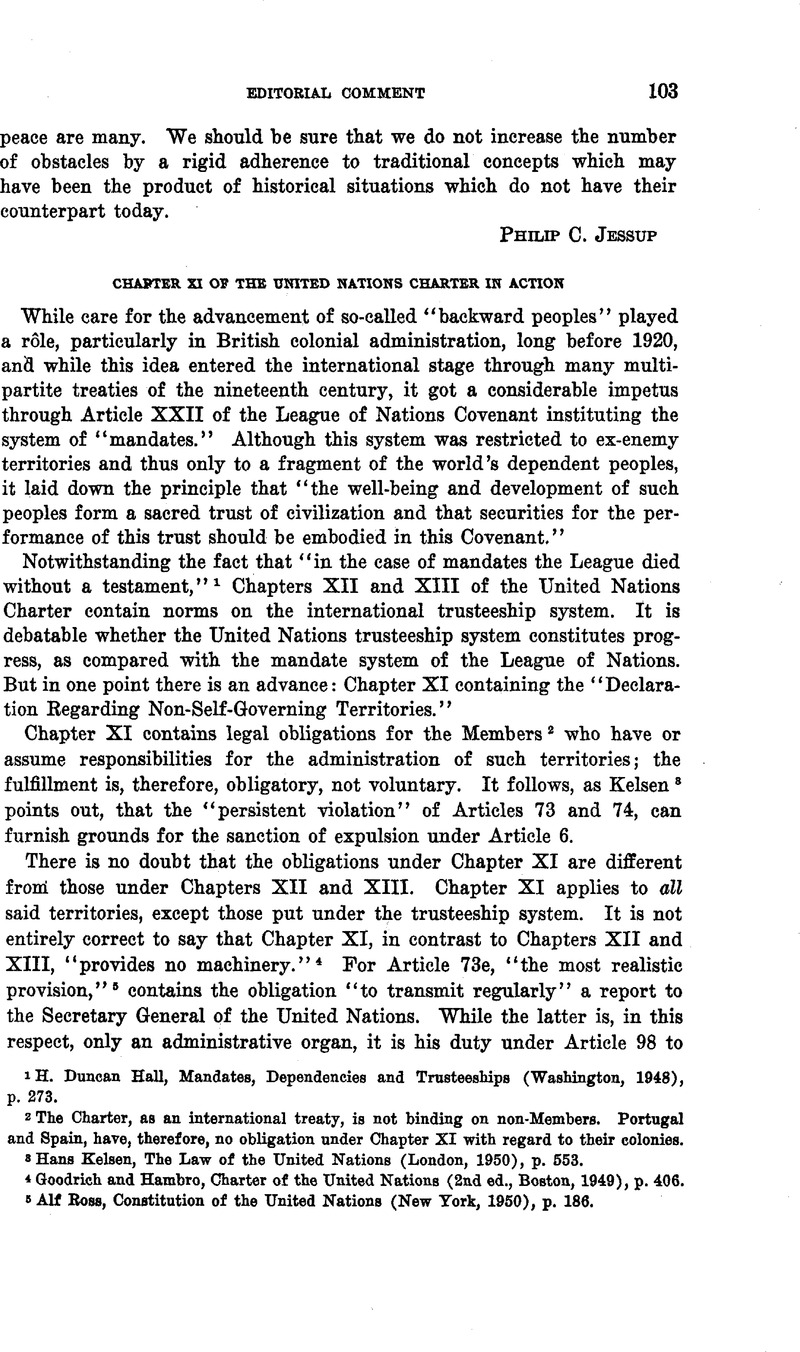Published online by Cambridge University Press: 30 March 2017

1 Duncan Hall, H., Mandates, Dependencies and Trusteeships (Washington, 1948), p. 273 Google Scholar.
2 The Charter, as an international treaty, is not binding on non-Members. Portugal and Spain, have, therefore, no obligation under Chapter XI with regard to their colonies.
3 Kelsen, Hans, The Law of the United Nations (London, 1950), p. 553 Google Scholar.
4 Goodrich and Hambro, Charter of the United Nations (2nd ed., Boston, 1949), p. 406 Google Scholar.
5 Ross, Alf, Constitution of the United Nations (New York, 1950), p. 186 Google Scholar.
6 Art. 2, par. 1.
7 Art. 2, par. 7.
8 Goodrich and Hambro, op. cit., p. 78; Bentwieh, N. and Martin, A., A Commentary on the Charter of the United Nations (New York, 1950), p. 144 Google Scholar.
9 See Kelsen, op. cit., who speaks of “highly ambiguous definitions” (p. 555) and of the formulation of obligations “in rather vague terms” (p. 558). Bentwieh and Martin, op. cit., state that “the formulation is bafflingly vague in many points” (p. 143).
10 This formula is taken from Art. 22 of the Covenant of the League of Nations.
11 Op. cit., p. 185.
12 Op. cit., p. 143.
13 But in its reply to the Ad Hoc Committee on Factors (A/AC.67/2, May 8, 1953, pp. 37–40) the United States insisted strongly on democratic principles with regard to “full self-government.”
14 Op. cit., p. 557.
15 See, particularly, Boss, op. cit., p. 178; Kelsen, op. cit., pp. 555–556.
16 But the above-quoted reply (note 13 above) of the United States called “special attention to the tragic cases of those peoples who had independence prior to World War II, but who had since had a dependent status imposed upon them.”
17 Op. cit., p. 180.
18 Op. cit., p. 406.
19 Commentary on the U.N. Charter (Cmd. 6666 (1948), p. 11).
20 Belgium, France, the United Kingdom, The Netherlands, Denmark, the United States, Australia and New Zealand.
21 The United States reported not only on Guam, Samoa, the Virgin Islands and Puerto Rico, but also on the territories of Alaska and Hawaii. Many Latin American Republics also have territories and do not report on them. The United States reply (note 13 above) pointed out that “other states might also have obligations in relation to territories under their administration.”
22 Goodrich and Hambro, op. cit., p. 79.
23 That was, for example, the wish of the Soviet Union at the 3rd Session of the General Assembly (Paris, 1948) that political information in the reports under Article 73e be made obligatory.
24 General Assembly, 2nd Session, 1947, A/P.V. 106.
25 This hope was based on Art. 77 (1 c).
26 The New York Times, Oct. 16, 1953, p. 6.
27 General Assembly, 2nd Session, 1947, A/P.V. 108.
28 Seventh Session, 1952, A/2178 (Sept. 16, 1952).
29 See note 13.
30 In Spanish: Estado Libre Asociado de Puerto Rico.
31 The New York Times, Oct. 10, 1953, p. 8.
32 Ibid., Oct. 5, 1953, p. 8.
33 U.N. General Assembly, A/AC. 67/2, May 8, 1953, pp. 3–31. See also the speech of the Belgian representative, Joseph Nisot, in the Ad Hoc Committee on Factors (Nations Unies, Communiqué de Presse PM/2550, 21 juillet 1953).
34 See: “Guarantees no longer enjoyed by many indigenous peoples” (pp. 13), transmitted by the Belgian Government Information Center in New York; the article: “Les Communautés indigènes au Pérou d'après la Constitution PSruvienne de 1933,” in the review, Civilizations, Vol. Ill (1953); the article by Professor F. Van Langenhove, permanent representative of Belgium to the U.N.: “Continuié de la Mission de Civilisation,” in the review, Synthèses, 8e année, No. 95, p. 21.
35 See also Duncan Hall, op. cit., pp. 40–43.